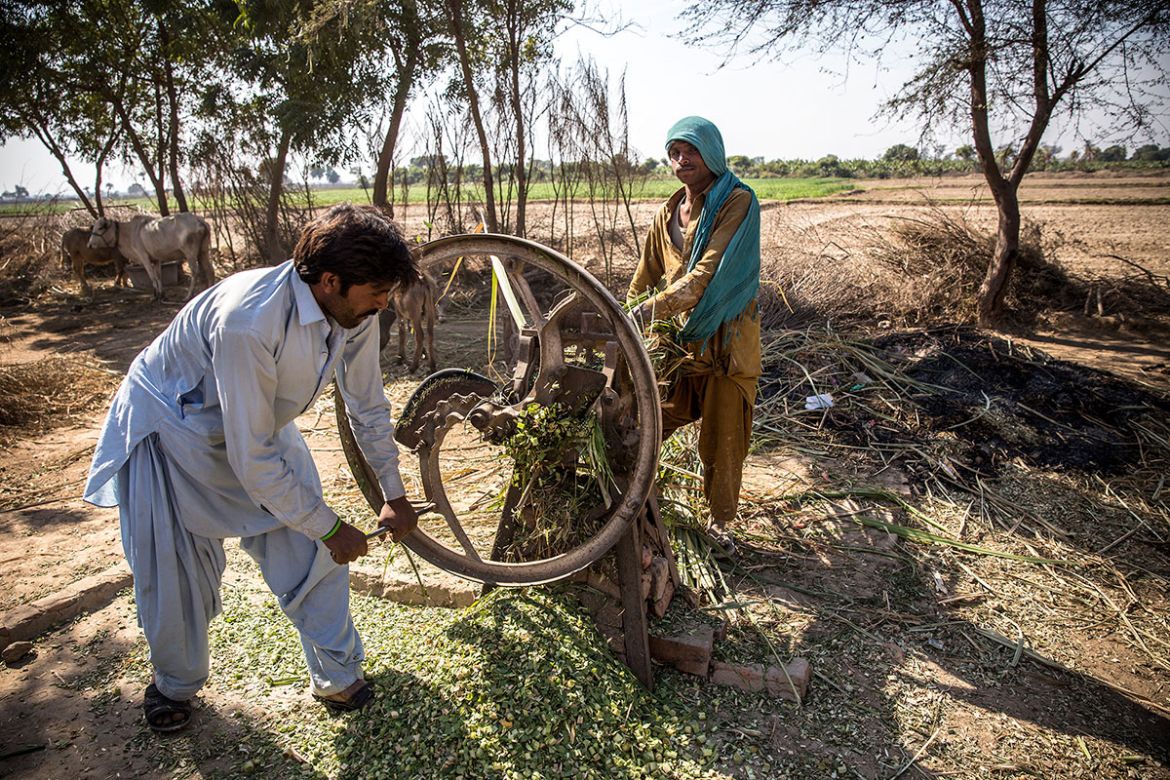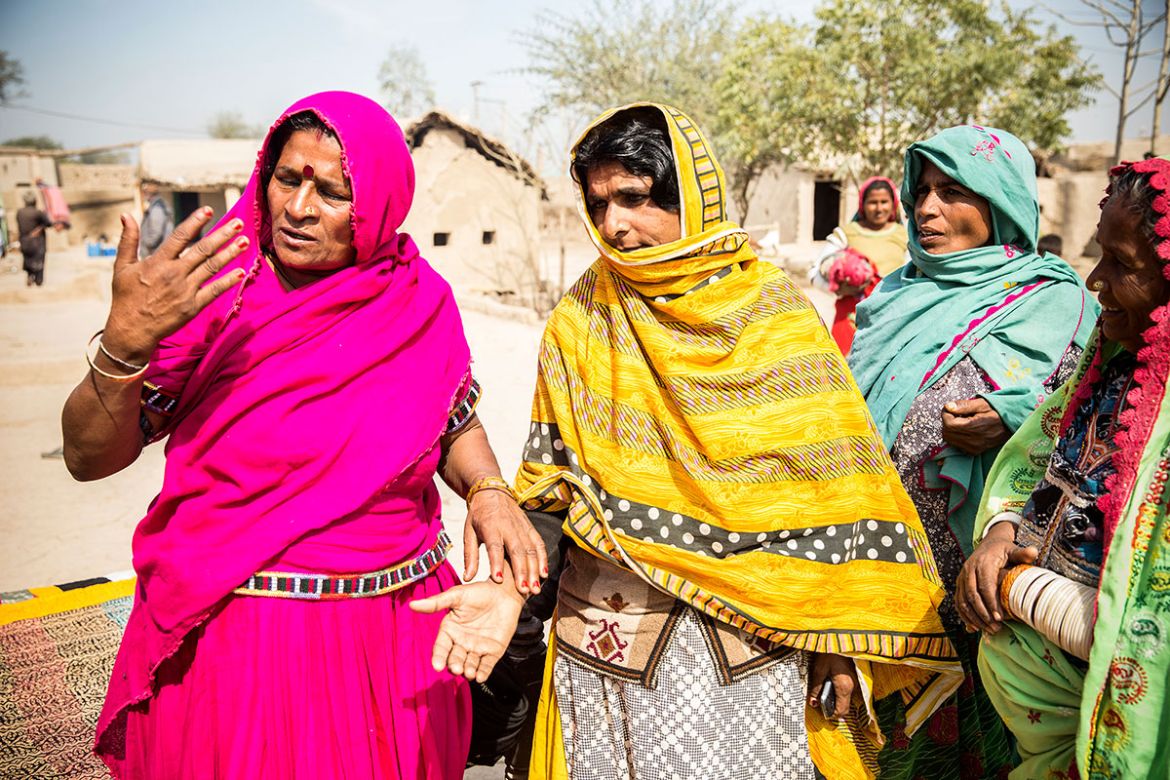In Pictures
A new life after bonded labour in Azad Nagar, Pakistan
A small settlement in Pakistan’s Sindh province provides opportunity for freed formerly bonded labourers to start over.
![Azad Nagar, Pakistan [Faras Ghani/Al Jazeera]](/wp-content/uploads/2017/05/2a7bfacc425a455a817a40932de7282d_8.jpeg?resize=1170%2C780&quality=80)
Sindh, Pakistan – Azad Nagar is a small, marked settlement around 200km north of Pakistan’s coastal city of Karachi.
Most of the houses in this community spread over 11 acres are made of baked clay with thatched roofs of straw strung together.
Azad Nagar means land of the free. The land was bought in 2006 by Green Rural Development Organisation (GRDO), a Pakistani NGO, with the help of Action Aid.
“The concept behind Azad Nagar was of a transit camp where freed bonded labourers would come and stay before moving on to where a job would take them,” Ghulam Haider, one of the co-founders of GRDO, told Al Jazeera.
Today, more than 100 families live here in houses that lack electricity and running water. A small temple serves as a place of worship for the Hindu-majority who live here.
Almost 45.8 million people are trapped in bonded labour across the world. Pakistan is home to more than two million of them, according to the Global Slavery Index.
READ MORE: Veeru Kohli – A bonded labourer who took on the Bhuttos
A small loan taken out by a labourer – for a hospital bill or a small wedding – soon spirals out of reach. The landlord finds every excuse to trap the workers. They are threatened in every manner possible to prevent them from running away or asking for help.
Bonded labour can be found in agriculture, brick kilns, mining and fishing industries.
Syeda Ghulam Fatima, the award-winning activist who started the Bonded Labour Liberation Front (BLLF), is another individual fighting for the abolishment of bonded labour.
“The condition these people find themselves in is something I can’t even describe,” said Fatima.
“The parliament building you see, it’s made of bricks these people made. But there is no law helping them. Hospitals are made out of bricks they made, but there is no health facility for them.
“There is no education for these poor people even in the schools that are made from the bricks those children made. There is no justice for them despite the court buildings made out of the bricks these people made in that scorching heat.”
Follow Faras Ghani on Twitter: @farasG
![Azad Nagar, Pakistan [Faras Ghani/Al Jazeera]](/wp-content/uploads/2017/05/954b4384cd3a4cb2980d7a58e1db7aae_8.jpeg?fit=1170%2C780&quality=80)
![Azad Nagar, Pakistan [Faras Ghani/Al Jazeera]](/wp-content/uploads/2017/05/526c35985e2946c9b29a3abb98c1bbfa_8.jpeg?fit=1170%2C780&quality=80)

![Azad Nagar, Pakistan [Faras Ghani/Al Jazeera]](/wp-content/uploads/2017/05/72f879493d7e468fbec96cc1ccc96997_8.jpeg?fit=1170%2C780&quality=80)
![Azad Nagar, Pakistan [Faras Ghani/Al Jazeera]](/wp-content/uploads/2017/05/5f5df1adc3744d2b8c831108c4d25cbf_8.jpeg?fit=1170%2C780&quality=80)
![Azad Nagar, Pakistan [Faras Ghani/Al Jazeera]](/wp-content/uploads/2017/05/5fe64bd4a7024b76aae740ee23884a5b_8.jpeg?fit=1170%2C780&quality=80)
![Azad Nagar, Pakistan [Faras Ghani/Al Jazeera]](/wp-content/uploads/2017/05/974c123ffa194f2c90f903ab4e8498d6_8.jpeg?fit=1170%2C780&quality=80)
![Azad Nagar, Pakistan [Faras Ghani/Al Jazeera]](/wp-content/uploads/2017/05/89f282ae60174ed0b1be64f629180e74_8.jpeg?fit=1170%2C739&quality=80)
![Azad Nagar, Pakistan [Faras Ghani/Al Jazeera]](/wp-content/uploads/2017/05/1f1bbebe8fba445bb271f8cbc8e7d8df_8.jpeg?fit=1170%2C780&quality=80)
![Azad Nagar, Pakistan [Faras Ghani/Al Jazeera]](/wp-content/uploads/2017/05/052af309b1124b06bea78cbde22ba854_8.jpeg?fit=1170%2C780&quality=80)

![Azad Nagar, Pakistan [Faras Ghani/Al Jazeera]](/wp-content/uploads/2017/05/0b2ffec5af6f434b82a12107a8e6e7f8_8.jpeg?fit=1170%2C759&quality=80)
![Azad Nagar, Pakistan [Faras Ghani/Al Jazeera]](/wp-content/uploads/2017/05/302a7d6d3b63425bbfc799a237e461fa_8.jpeg?fit=1170%2C780&quality=80)
![Azad Nagar, Pakistan [Faras Ghani/Al Jazeera]](/wp-content/uploads/2017/05/0cf37b7b1c304b76bba926e7fc12bcb4_8.jpeg?fit=1170%2C780&quality=80)